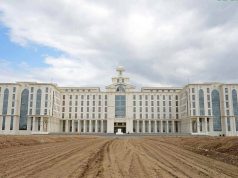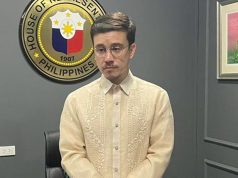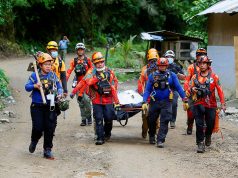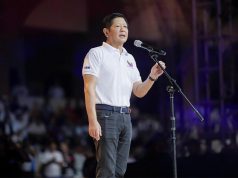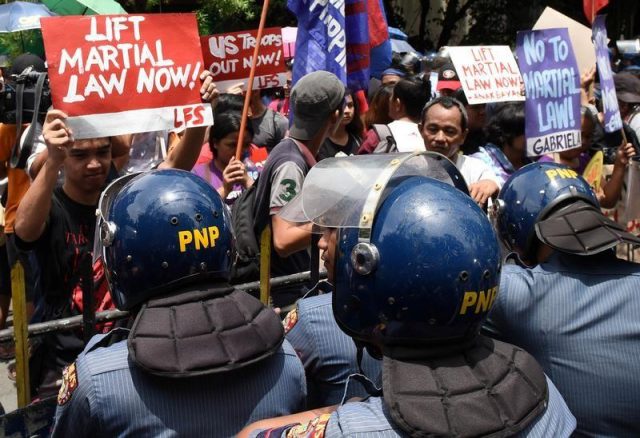
Protests against the extension of martial law in Mindanao continued after congress voted to grant President Rodrigo Duterte’s request to extend martial rule in the southern region.
The Senate after 12 votes of ‘yes’, five votes of ‘no’, and one abstention voted to grant the president’s request while the House of Representatives yielded 223 ‘yes’ votes and 23 ‘no.’
Both chambers of congress are required by the constitution to vote jointly upon the president’s request to extend martial law.
The previous extension approved by Congress will end on December 31, 2018.
Executive Secretary Salvador Medialdea said at the joint session that the extension was necessary to curb the communist and Islamic extremist insurgencies in the southern island.
He explained that Islamic extremist groups such as the Abu Sayyaf, Bangsamoro Islamic Freedom Fighters and Maute Group among others were still carrying out bombings in the region.
Senate Minority Leader Franklin Drilon countered Medialdea’s explanation, saying that the factual basis for declaring martial law in the island was non-existent.
He argued that Duterte’s request did not sufficiently prove that there was actual rebellion and uprising on the island that justified the extension.
“Martial law is the highest form of self-preservation. It cannot be the norm,” Drilon said at the session.
Opposition lawmaker Rep. Edcel Lagman (Albay) said that extending martial law was no longer legal as Duterte himself had already declared the city of Marawi was no longer under attack.
The Marawi Siege of 2017 had been Duterte’s basis for declaring martial rule in the Mindanao.
Several groups and critics of the proposed martial law extension took to the streets upon the opening of the joint session to protest against the planned extension.
#NoToMartialLawExtension. “As senators and congressmen decide on extending martial law in Mindanao, hundreds of Mindanaoans now holding a rally at the House of Representatives to air their opposition against extension of military rule in their provinces” Photo via Katrina Yamzon pic.twitter.com/8Y294UsZQq
— Noemi L. Dado (@momblogger) December 12, 2018
The lawmakers who voted against the extension explained their rationale for opposing Duterte’s request.
Sen. Risa Hontiveros said that unlike the previous martial law extensions, a threat against the civil liberties of the residents was very possible.
She also expressed concern about martial law being implemented with the coming May 2019 elections.
Like in the past extensions, I find no cogent rationale for martial law that our existing legislation & the capacity of our military & police forces cannot address.
I VOTE NO. pic.twitter.com/J6JwJD3MZV
— risa hontiveros (@risahontiveros) December 12, 2018
Kabataan Party-list Rep. Sarah Elago in her explanation of her ‘no’ vote pointed to the kind of abuses martial law gave rise to.
“Military and police forces as well as the law itself are used not for the safety of the citizens, farmers, laborers and Lumad but for the security of large mining and oil companies and the interests of oligarchs and foreigners,” she wrote in Filipino.
Opposition continues
Several opposition groups have staged protests against the planned martial law extension since the Armed Forces of the Philippines and Philippine National Police both recommended the extension to Duterte.
Militant groups hold protest in front of the House of Representatives as the House deliberates on the extension of the martial law in Mindanao.#NoToMartialLawExtension pic.twitter.com/ypA9YIkv3G
— NUSP (@NUSPhilippines) December 12, 2018
Outgoing AFP chief Gen. Carlito Galvez earlier explained that there was general clamor for the extension due to the presence of terrorism in the region.
Duterte said in his letter to Congress that martial law in Mindanao was necessary to help military and police forces fight against threats of insurgency in the region.
A number of local officials in the Autonomous Region in Muslim Mindanao recently voiced their support for martial law extension, some even motioning the extension should be co-terminus with the remainder of Duterte’s years in office. His term ends in 2022.
Those opposing martial law in the region have claimed that Duterte’s declaration facilitated numerous human rights violations.
Rights group Karapatan submitted a report to the United Nations in May 2018 claiming that scores of extrajudicial killings as well as incidents of torture and harassment against peasant and indigenous leaders have taken place since Duterte’s martial law declaration in 2017.
Kabataan Party-list claimed in a recent statement that a number of recent attacks on indigenous leaders were carried out by police, military and paramilitary groups.




